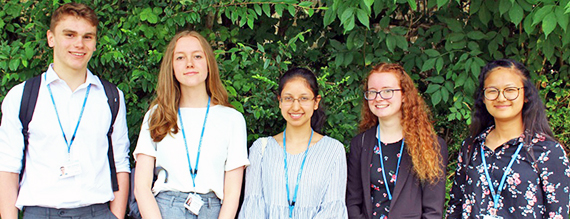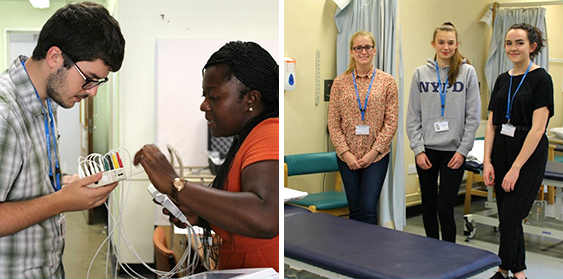Work Experience & Apprenticeships
Work Experience
Work Experience
Here at the Royal United Hospitals Bath NHS Foundation Trust (RUH), we are committed to offering work experience to students from schools and colleges to support young people into future NHS careers. If you are thinking of a career change towards health, we might be able to help too.
Work experience can help you decide on your next step in your career. Don't take our word for it, watch the videos below to see what Jack, a previous work experience student, and Tina, a work experience supervisor at the RUH, think about it.
RUH Work Experience 2018 – Jack
RUH Work Experience 2018 – Tina
In person Work experience applications are now closed
BSW offer free virtual Healthcare work experience. Which is available for students 14+ who live in the Bath, North East Somerset, Gloucestershire, Swindon, Wiltshire, Yeovil, Sherborn or Wells Region. Find further details here Health and Social Care Work Experience - South West | Springpod.
For further information about careers in the NHS, visit our 'Advice and Support page'. You will be able to find links to other helpful websites as well as resources about the different jobs available in the hospital.
Work experience applications are now closed

When can applications be made?
- Applications can only be made at certain times of the year - e.g. spring when we are advertising for a programme
- Applications are made by submitting application forms which can be downloaded from the external website. Students submit their application forms the Apprenticeship & Career Engagement Team
- Adverts for each role / profession open and close at different times of the year
- Keep an eye on this page – when each advert is ready, we will update the Current Work Experience Opportunities section of this page and include details about the type of work experience available
- Potential applicants can keep informed about when adverts go live by following @RUH_Careers on X(Twitter), liking the RUH's Facebook page or following RUHBath on Instagram (*they need to be aged 13 or over to hold these social media accounts)
This central application process is now the only way in which you can access work experience at the RUH. We will receive all applications centrally. If there are more applications than places, all applications will be assessed using a shortlisting criteria. The aim is to have a clear central application process to give everyone a fair chance.
Please do not approach our staff members directly and ask them to supervise your work experience.
If you would like to find out more information around our opportunities please email the Apprenticeship and Career Engagement Team ruh-tr.careersengage@nhs.net
What we offer
We use labour market information that tells us about the local or national demand there is for different skills and from different industries. Labour market information tells us:
- Which jobs are likely to be easiest or hardest to find in our area
- Which are the big employers in different areas and which ones have jobs on offer
- What skills employers are looking for and which are in short supply
- How much you can expect to be paid in specific jobs
- What working conditions are like
- What qualifications will be most helpful if you want a certain career
- What the jobs of the future might look like and which jobs might disappear
All of these factors can help you make a more informed decision about what career path to take.
What's the difference between the national and local labour market?
National labour market information tells you about jobs and industries in the UK as a whole, whereas local labour market information focuses on one particular area - e.g. Cumbria. When researching the labour market for specific careers, both local and national information can be helpful.
Looking at national labour market information will give you a good overall picture of the opportunities open to you in each career area.
When looking at your career options at school, it's important that you find out as much as you can about the industry that you'd like to work in. Knowing how much you'll be paid, how competitive the job market is and where most jobs are based can all influence your decision in pursuing a career.
How the Royal United Hospital uses this information in our Work Experience offer
The Trust offers a number of different opportunities in line with the Gatsby Benchmarks
- Trusts SEND offerOur careers programme are:
- Step-in, this is where our current provision doesn't offer any thing for those with needs that are over 25. The syllabus is strongly linked to 'employability skills' which is at the heart of the learners outcomes.
- DFN Project SEARCH, we have been running this programme for over 15 years and have employed more than 52 young people who have an Education and a Health plan. The curriculum is developed with managers in each area and detailed in our curriculum plans for each intern.
- These includes an employability qualification to show that they have the skills. This will also be backed up with a reference from the Trust, for any future employment opportunities that they undertake.
- The programmes have trained staff responsible for delivery of education side of the programme and they have also got an allocated Job Coach, along with a placement supervisor.
- Internship review meetings where interns discuss transition, employment, and study options.
- Placements will vary in length for each internship. Project SEARCH will have 3 x 10 week placements developing their needs on each placement. Step-in will have either 1 or 2 placements of 10 weeks depending on their needs.
- Collaborative working in support of LMI
- We have strong links with our partners with the our system, where we work together by ensuring that the informed presented in the LMI for B&ANES and Wiltshire labour market intelligence are linked to those placement areas in key areas which are supported through vocational pathways.
- Through our ambassador networks in the RUH, we provide support when applying for job and helping them understanding the job market
- We offer this through school engagement opportunities
- JCP Mentoring Circles programme
- DWP Care leaver programme
- Support to each young Person
- With a focus on challenging stereotypical thinking and aspirations of disability and employment through our supported Internships. We have seen how wards/department have benefitted from having these young people in the Trust working.
- Where possible the programmes we offer providing a person-centred focus on career development, placements which are linked to skills and their interests. This will also depend on any safeguarding requirements, as some placements areas will not be suitable.
- Linking careers to syllabus
- The employability pathways syllabus is linked directly to the work-based learning and placements hours.
- Project SEARCH = 5 days a week (placements from 10 – 3 normally 5 days per week but will be reduced depending on interns needs)
- Step-in = also 5 days a week (placements times are based on individual's needs)
- Years 12 & 13 Work Experience is normally 2 days in general from 9 – 4. This may very to meet the needs of the area and the student. This can be over 5 days+ and may be broken over a number of weeks.
- Career Evening for year 10+, runs twice a year from 5 – 7.30 to allow students to get hear without missing study time.
- T-Levels students will be placed in those areas that they are studying to meet the placement hours that's required for that programme. This will be designed with the College and the placement area to ensure that learning outcomes are met.
- Through employability programmes and talks with young people we discuss why English and maths and other subjects are key to employers. If any young person applies for a role, they will be offered to study English and maths if they don't have the required attainment levels on their application
- We offer a number of tours and visits to the Trust and where possible we do ask some of the local employers to come along to those session. We try to offer a range of placements to our young people that is linked to their skills or to an interest. This way it helps to build the rapport with that person and allow them to see the benefits of what the placement offers
- We also offer an open virtual WEX that we co-designed by all partners with the BSW, This helps to provide an offer to those young people who can't get a face to face placement
The Royal United Hospital is part of a number of different employer stake groups, to ensure that what we offer those young person leads in to employment or further study to help them to reach the carer aspiration. For example, working with WIN group as an employer to ensure that those young people who may not consider HEI is an option for them. Or working with FEI to ensure that the curriculum meets the needs of both us as an employer, the outcomes of their study and what their needs are.
We try to offer a personal approach to each young person who joins one of these programme. The main one who have a personal plan will be those on, DFN Project SEARCH, Step-in, Mentoring Circles and T-Levels.
Feedback happens on a weekly bases to ensure that they are meeting the requirements and exploring further opportunities in the area to help those who are looking for employment.
We are designing with our local FEI College a SWAP programme for young people who are ages 16-18 or have not been selected for interview to help them gain the evidence and the experience required to show during the interview process.
Work experience would ideally be related to the topics that young people are studying, however relatable experience would be equally as well received. This would include customer relations, time management, deadline control, and team working skills that are learnt through a number of different methods.
For the transition programme, the expectation of WEX is that you would be looking to participate in a minimum of 25 hours over the course of the programme. This would not only gain them the much needed experience before progressing onto the 2 years of the T-Level programme, but would also serve to give those young people a much more robust understanding the application of the skills that they are learning in their studies.
Across the two years of study of the T-Level programme, the WEX is a much more substantial element, and is referred to as the Industry Placement. With a requirement that they complete 315 hours over the course of the study programme. With this starting in the first year (approximately March), and completing towards the end of the second year.
For the purposes of the 315 hours, this would need to be undertaken with no more than two different employers over the two years. Industry placement officers are on hand to help to prepare them for placements, and would also help them in finding opportunities. Those undertaking Health related subjects are completing year 1 in the community, with their second year in the acute setting.
About our work experience programme

To read more, click on the title for the relevant section below (then click again to close it).

